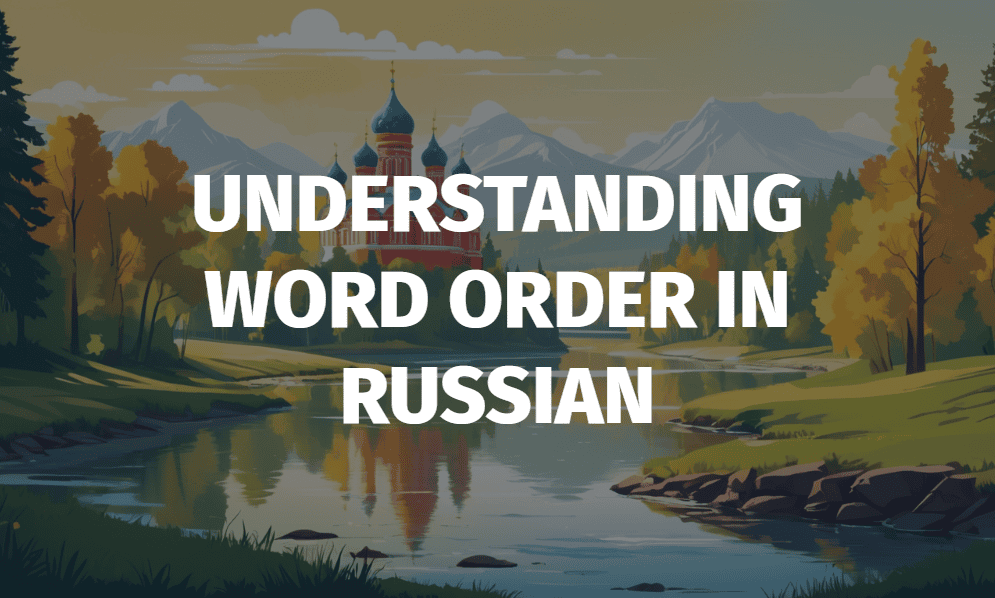
Understanding Word Order in Russian
Russian word order can be challenging for English speakers due to its flexibility compared to the relatively fixed Subject-Verb-Object (SVO) structure of English. This flexibility is made possible by Russian’s extensive case system, which marks the grammatical function of words regardless of their position in a sentence. Understanding this flexibility is key to mastering Russian syntax and effectively communicating in the language.
Basic Word Order
While Russian word order is flexible, there is a neutral or default order commonly used in everyday speech and writing:
Subject-Verb-Object (SVO)
Example:
Я́ чита́ю кни́гу.
[ya chee-TA-yu KNEE-gu]
I am reading a book.
This is the most straightforward way to construct a sentence, however, it can change depending on various factors, including emphasis, style, and context.
Factors Influencing Word Order
1. Emphasis
In Russian, the most important or new information typically appears at the end of the sentence. You can shift the emphasis by altering the word order.
Example:
Кни́гу чита́ю я́.
[KNEE-gu chee-TA-yu ya]
It is I who is reading the book.
Here, the focus is on я (I), emphasizing that the speaker, rather than someone else, is the one reading the book.
2. Questions
In questions, Russian maintains a structure similar to statements but places the question word (if any) at the beginning.
Example:
Он живёт здесь. => Он живёт здесь?
[on zhee-VYOT zdyes’] => [on zhee-VYOT zdyes’]
He lives here. => Does he live here?
Где́ ты живёшь?
[gdye ty zhee-VYOSH]
Where do you live?
Unlike in English, there is no need to invert the subject and verb.
3. Possessive Constructions
In possessive constructions, the possessor usually comes before the object possessed.
Example:
Э́то моя́ кни́га.
[E-ta ma-YA KNEE-ga]
This is my book.
Here, моя́ (my) indicates possession, showing that the book belongs to the speaker.
4. Adjectives
Adjectives in Russian typically precede the nouns they modify, just like in English.
Example:
Кра́сная маши́на.
[KRAS-na-ya ma-SHEE-na]
Red car.
5. Adverbs
Adverbs of manner usually come before the verb they modify.
Example:
Он бы́стро бе́гает.
[on BYST-ra BYE-ga-eet]
He runs quickly. (Lit.: He quickly runs.)
This placement emphasizes the manner in which the action is performed.
Advanced Word Order Patterns
1. Topic-Comment Structure
Russian often uses a topic-comment structure, where the topic (what is being discussed) comes first, followed by a comment about it.
Example:
Москва́ – э́то столи́ца Росси́и.
[mas-KVA – E-ta sta-LEE-tsa ra-SEE-ee]
Moscow is the capital of Russia.
In this sentence, Moscow is the topic, and the comment (is the capital of Russia) follows.
2. Emotional or Colloquial Speech
In emotional or colloquial speech, the most important element often comes first to express strong feelings.
Example:
Уста́л я́ от всего́ э́того!
[us-TAL ya at vsee-VO E-ta-va]
I’m tired of all this!
Here, “уста́л” (tired), comes first, emphasizing the speaker’s exhaustion.
3. Subordinate Clauses
In complex sentences, subordinate clauses often precede the main clause.
Example:
Когда́ я́ пришёл домо́й, она́ уже́ спала́.
[kag-DA ya pree-SHOL da-MOÎ, a-NA u-ZHE spa-LA]
When I came home, she was already sleeping.
The subordinate clause (When I came home) sets the stage for the main clause (she was already sleeping).
Common Mistakes for English Speakers
1. Keeping English word order in all situations
2. Placing adverbs at the end of sentences
3. Not using flexible word order for emphasis
4. Misplacing the negation particle “не” (not)
Practice Exercises
1. Reorder the following sentence for emphasis on different elements:
Студе́нты изуча́ют ру́сский язы́к в университе́те.
[stu-DYEN-ty ee-zu-CHA-yut RUS-keeî ya-ZYK v u-nee-veer-see-TYE-tye]
Students study Russian at the university.
Possible reorderings:
2. Create questions using the following elements:
– Кто (who)
– Что (what)
– Где (where)
– Когда́ (when)
– Почему́ (why)
Examples:
3. Translate the following sentences into Russian, paying attention to word order:
– I like to read interesting books.
– She quickly ran to the store.
– This red car belongs to my father.
Conclusion
Mastering Russian word order takes practice and a keen understanding of how emphasis and context can change the meaning of a sentence. While there is a neutral order, Russian allows for creative and nuanced expression through flexible word order. By practicing different sentence constructions and paying attention to where you place emphasis, you’ll be able to communicate more effectively and naturally in Russian.